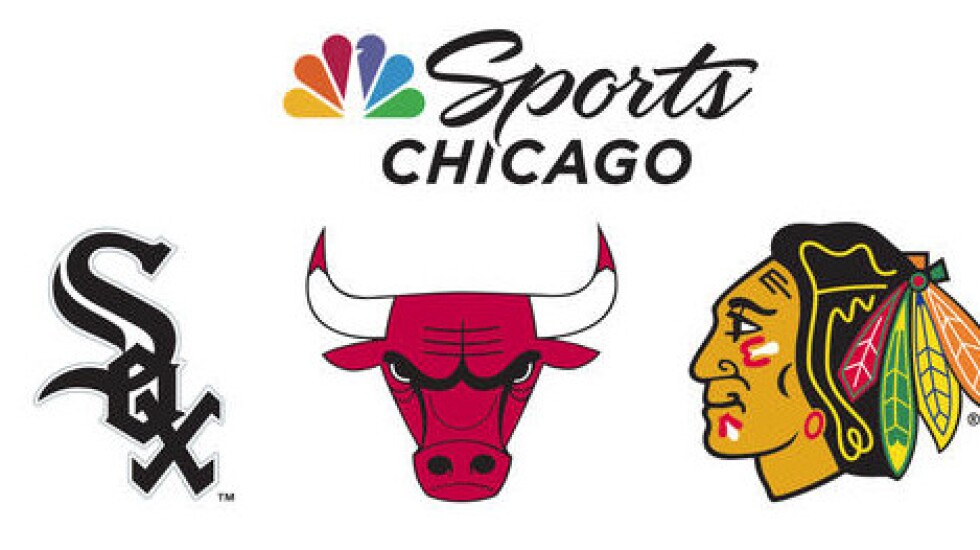
Less than 10 months remain in the TV-rights agreement between NBC Sports Chicago and its teams, the Blackhawks, Bulls and White Sox. While the trio take their products to the marketplace, the folks at NBCSCH sit on pins and needles, awaiting their fate.
Sounds dramatic, doesn’t it?
Even as we enter the final calendar year of the contract, the real drama has yet to play out. In fact, it’s pretty quiet right now.
Though Chicago has been spared the chaos that has engulfed markets with crumbling regional sports networks, there’s plenty of uncertainty. The way we see it, come October, the teams could take their broadcasts one of three ways. Here’s a breakdown:
Stay with NBC Sports Chicago
This is the easiest option, and it might be the most prudent. NBCSCH is stable and has the backing of parent NBCUniversal, which also has RSNs in Boston, Philadelphia and Northern California. The sports media landscape continues to evolve, with streaming and direct-to-consumer services becoming more prevalent. The teams might be better off waiting another two or three years to see what develops.
NBCSCH has pulled out all the stops to keep the teams’ business. It has produced alternate broadcasts for each team, including a gambling-centric show for Bulls games and a Spanish-language call for Sox games. This season, it debuted “HawkCast,” which focuses on individual players during games and interviews guests.
But how much longer does NBCU want to stay in the RSN game? Cable penetration is down significantly in the Chicago market, and that’s skewing ratings. NBCU would’ve loved to unload its RSNs a few years ago, if there had been a buyer, and it was happy to let Ted Leonsis, owner of the Capitals, Mystics and Wizards, take NBC Sports Washington off its hands and turn it into Monumental Sports Network.
Which segues nicely into option No. 2.
Turn Stadium into an RSN
Last spring, Bulls and Sox owner Jerry Reinsdorf acquired majority control of Stadium, the multiplatform sports network housed in the United Center Atrium. He launched it in 2017 with Sinclair Broadcast Group, which later used Stadium to supply its Bally Sports-branded RSNs with nongame programming. When Sinclair offloaded the RSNs to subsidiary Diamond Sports Group, it didn’t need Stadium anymore.
With full control of the operation, Reinsdorf, along with Hawks chairman Danny Wirtz, could make Stadium the teams’ new home. It would need to be distributed to cable and satellite providers (which is no layup; Comcast didn’t carry the Cubs’ Marquee Sports Network until the day of their first game in 2020), but Stadium is already equipped to go live. It also has streaming capability in place.
It would be interesting to see how NBCSCH and Stadium would combine staff. Some NBCSCH personnel have been around for each iteration of the network, dating back to the SportsChannel days. That trend certainly could continue. It would be a bold move and one fraught with pitfalls, but it could be the most lucrative option for the teams.
Return to broadcast TV
No, the teams aren’t crawling back, hat in hand, to WGN, which is a shame. But they are talking with local broadcast outlets about the possibility of airing their games. This is the most complicated option considering the channels’ scheduling commitments and the financial permutations of a deal. But as we’ve written here before, teams across the country are heading back to broadcast TV.
The issue, of course, is money. Cable, satellite and streamers charge customers a monthly regional sports fee to cover channels such as Marquee and NBCSCH. If the teams abandon the RSN model, they will lose that revenue stream.
Distributors also charge a broadcast TV fee. This helps pay broadcasters’ retransmission fees. Without the regional sports fee, the teams likely would want a piece of the retransmission pie. Broadcasters can’t afford to give up that revenue, especially considering advertising revenue isn’t what it used to be. But would the value of carrying the games make some agreement possible?
There’s only 271 days until Oct. 1, and there’s a lot of work to do.
Remote patrol
The Score swept ESPN 1000 in the Nielsen fall ratings book (Sept. 14-Dec. 6) in the key demographic of men 25-54, despite ESPN landing the Bears’ radio rights. In prime listening hours (6 a.m.-7 p.m. weekdays), The Score drew a 5.5 share, ranking third in the market, to ESPN’s 2.7, which was 18th.
In the morning, The Score’s “Mully & Haugh” beat ESPN’s combination of national programming and “Kap & J.Hood” 6.2-2.5. Middays, “Bernstein & Holmes” beat the combination of Mike Greenberg’s national show and “Carmen and Jurko” 6.1-2.4. And in the afternoon, “Parkins & Spiegel” beat “Waddle & Silvy” 4.8-3.1.
ESPN and the NCAA agreed to an eight-year deal, reportedly worth $920 million, that will allow the network to air 40 championships (21 women’s and 19 men’s events), including the women’s basketball tournament, baseball and softball. The deal, which begins Sept. 1, brings an increase of more than 300% per year from the previous 14-year agreement.
CBS is sending its top crew of Jim Nantz, Tony Romo and Tracy Wolfson to call Bears-Packers on Sunday.
Public-service announcement: The Oilers-Blackhawks game Tuesday is paywalled. It will be available on ESPN+ and Hulu.







